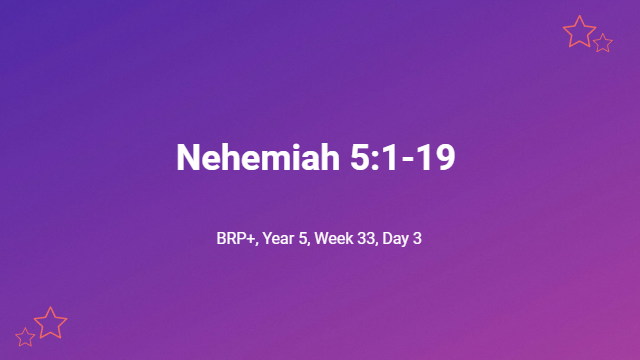Nehemiah 5:1-19
Q.1. What additional trial made the rebuilding of the wall discouraging? How did this affect the morale of the workers and their families? – (Neh.5:1-5 c.f. 3:5)
Because they were working on the wall, many of the labourers could not cultivate their own blocks. Some of them had mounting debts to their own countrymen – Now there was a great outcry of the people and of their wives against their Jewish brothers (Neh.5:1). There was a famine, and they needed food for their families. These faithful workers had mortgaged their fields and had borrowed money to meet their obligations (Neh.5:2-4). They complained – … we are forcing our sons and our daughters to be slaves, and some of our daughters are forced into bondage already, and we are helpless because our fields and vineyards belong to others (Neh.5:5). Perhaps some of the nobles who refused to work, were among the ones who put their countrymen into slavery (c.f. Neh.3:5; 6:17-18).
Q.2. What did Nehemiah do to alleviate the problem? What solution did he offer the creditors? How did the leaders respond? – (Neh.5:6-13)
Nehemiah was furious when he realized the plight of his workers. He called a mass meeting in protest. He argued that it was unthinkable that Jewish bosses were placing their own race back into the slavery from which they had been freed (Neh.5:6-8). He had modelled sacrifice by lending money without interest. He charged the money lenders with setting a poor example to the surrounding nations – … The thing which you are doing is not good; should you not walk in the fear of our God because of the reproach of the nations, our enemies? (Neh.5:9). Nehemiah made a bold request – Please, give back to them this very day their fields, their vineyards, their olive groves, and their houses, also the hundredth part of the money and of the grain, the new wine and the oil that you are exacting from them (Neh.5:11). The response was heartening – We will give it back and will require nothing from them; we will do exactly as you say.” So I called the priests and took an oath from them that they would do according to this promise (Neh.5:12).
Q.3. Did Nehemiah take advantage of the people? Why? How did he model sacrificial leadership? What did his prayer reveal about the man? – (Neh.5:14-19)
Leaders do not always set a good example. They will often demand their professional dues, regardless of the prevailing circumstances, or of how tough others are doing it. Nehemiah’s leadership was exemplary. He shared some of his testimony, documenting his own personal sacrifices. From the time he arrived in Jerusalem, for twelve years, unlike his predecessors, he had not taken the governor’s allowance – … because of the fear of God (Neh.5:15). Moreover, he regularly fed one hundred and fifty Jews and officials, plus other delegates, at great cost to himself – I also applied myself to the work on this wall; we did not buy any land, and all my servants were gathered there for the work … (Neh.5:16). Why the sacrifice? – … because the servitude was heavy on this people (Neh.5:18). His example was in sharp contrast to that of other leaders who were only concerned about themselves. He asked that the Lord would use his style of leadership to inspire the people (Neh.5:19).

